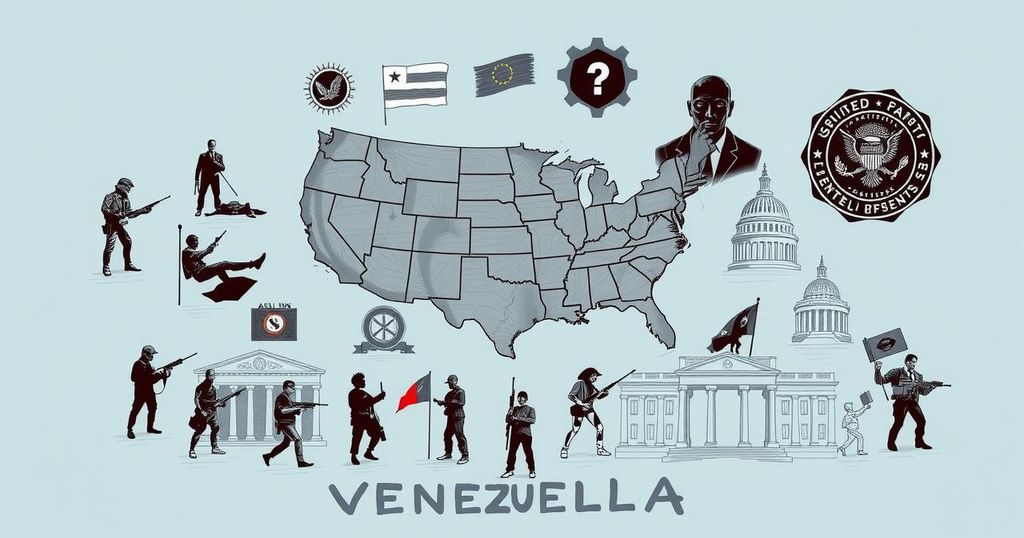Intelligence Memo Challenges Trump Claims on Venezuela’s Tren de Aragua Gang

U.S. intelligence agencies have published a memo contradicting President Trump’s claims that the Venezuelan government controls the Tren de Aragua gang. The memo states that while the Maduro regime allows the gang to operate, it does not orchestrate their activities in the United States. This revelation has implications for immigration policy and ongoing discussions about the chase for accurate intelligence in national security.
U.S. intelligence agencies have released a memo that directly contradicts President Donald Trump’s assertions regarding the notorious Tren de Aragua gang in Venezuela. The memo from the National Intelligence Council indicates that while the Venezuelan government permits criminal gangs to operate, it does not actively control Tren de Aragua’s operations within the United States. This is significant, as Trump has utilized this link to justify deporting immigrants, including Venezuelans, to a prison in El Salvador known for its harsh conditions.
The April 7 memo clarifies that the Maduro regime is not directing the gang’s activities. “While Venezuela’s permissive environment enables TDA to operate, the Maduro regime probably does not have a policy of cooperating with TDA,” the document states. It was made public following a Freedom of Information Act request submitted by the Freedom of the Press Foundation and was shared with NBC News. Notably, The New York Times was first to alert the public about the memo’s existence.
Trump’s administration has categorized Tren de Aragua as an invading force, invoking the 1798 Alien Enemies Act. The president has claimed that this gang is acting under the regime’s guidance, stating in his proclamation that they are conducting “irregular warfare” against the United States. This law has allowed for the deportation of Venezuelans, raising significant humanitarian concerns.
The intelligence community’s assessment indicates that the relationship between the Venezuelan regime and Tren de Aragua is highlighted by a complex mix of interaction. According to the memo, Venezuelan law enforcement sees the gang as a threat, resulting in a situation that’s characterized by an uneasy balance of cooperation rather than direct control. Furthermore, the FBI analysts noted a slight divergence in their views, suggesting that certain Venezuelan officials may facilitate migration of gang members to the U.S. for ulterior motives.
Critiques of the Trump administration’s reliance on problematic narratives surrounding Tren de Aragua have surfaced. Lauren Harper from the Freedom of the Press Foundation argued that the declassified memo disproves claims that disseminating the information poses a danger to public safety. “The DOJ’s new media rules are an excuse to target journalists,” she added.
In a pointed response, the Director of National Intelligence, Tulsi Gabbard, accused the media of manipulating intelligence assessments to serve political ends, asserting that illegal immigrant criminals create significant threats to American citizens. Moreover, she stated that there are conflicting intelligence assessments regarding the relationship between the gang and the Maduro regime, further challenging the administration’s narrative.
In the midst of these developments, Secretary of State Marco Rubio asserted that the origins of the gang’s operations are not the primary issue; rather, its detrimental impact resulting from the Maduro regime’s allowance is the crux of the matter. He declared that the government fostered the gang’s growth and that its actions have harmed U.S. national security.
Concerns have been raised among Democratic lawmakers over potential misinformation regarding the gang’s ties to the Venezuelan government. Rep. Joaquin Castro of Texas noted that the factual evidence contradicts claims asserting a close connection between Tren de Aragua and the Maduro government, suggesting a serious misrepresentation by the Trump administration.
In conclusion, the declassified memo from U.S. intelligence agencies challenges President Trump’s claims regarding the control of the Tren de Aragua gang by the Venezuelan regime. Despite utilizing this narrative to justify actions like deportations, the intelligence community suggests a more nuanced and complex reality. The discourse surrounding this issue raises substantial questions about legality, accuracy, and the administration’s communication with the public regarding immigration and national security threats.
Original Source: www.nbcnews.com






